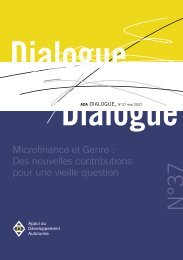Global microscope on the microfinance business environment 2012
Global microscope on the microfinance business environment 2012
Global microscope on the microfinance business environment 2012
Create successful ePaper yourself
Turn your PDF publications into a flip-book with our unique Google optimized e-Paper software.
59<br />
l The push to increase access to formal fi nancial<br />
services in all of Mozambique has been relatively<br />
successful: 60 of <strong>the</strong> 128 districts in Mozambique<br />
had bank branches at <strong>the</strong> end of 2011, up from just<br />
28 in 2004. Over <strong>the</strong> next three years, this number<br />
will grow as internati<strong>on</strong>al organisati<strong>on</strong>s team up<br />
with operators <strong>on</strong> <strong>the</strong> ground to c<strong>on</strong>tinue opening<br />
branches and MFIs in <strong>the</strong> most rural provinces.<br />
■ Nigeria<br />
Key characteristics of <strong>the</strong> microfi nance <strong>business</strong><br />
envir<strong>on</strong>ment:<br />
l A number of new licences have been issued since<br />
<strong>the</strong> closing of 224 illiquid microfi nance banks<br />
(MFBs) by <strong>the</strong> Central Bank of Nigeria (CBN) in<br />
2010. A large porti<strong>on</strong> of <strong>the</strong> populati<strong>on</strong> is still<br />
unbanked, particularly in <strong>the</strong> rural areas, and <strong>the</strong><br />
CBN is pushing policies, as mandated by <strong>the</strong> 2011<br />
Revised Microfi nance Policy Framework, to reach<br />
those unbanked, for example by encouraging new<br />
banks to open in <strong>the</strong>se regi<strong>on</strong>s.<br />
l Establishing a unit MFB, or an MFB with <strong>on</strong>e<br />
branch locati<strong>on</strong>, in Nigeria is relatively easy, and in<br />
2011 Nigeria was in <strong>the</strong> top three countries in Sub-<br />
Saharan Africa in terms of <strong>the</strong> greatest number of<br />
greenfi eld MFBs, as reported by CGAP in February<br />
<strong>2012</strong>. However, large state and even multistate<br />
MFBs have still found it diffi cult to transform into<br />
nati<strong>on</strong>al MFBs, although <strong>the</strong> path towards<br />
transformati<strong>on</strong> was delineated in 2010.<br />
l There is an increased focus <strong>on</strong> building capacity<br />
within MFB operators. The CBN runs a training<br />
programme for MFB management and is requiring<br />
that, by 2013, at least three management staff<br />
from each MFB have been certifi ed through this<br />
programme. There is also a new training<br />
programme for n<strong>on</strong>-executive directors, subsidised<br />
by <strong>the</strong> CBN.<br />
Key changes and impacts since last year:<br />
l Loan disputes are not typically resolved in <strong>the</strong><br />
court system. While a process exists for bringing<br />
cases before a judge, many MFBs choose to resolve<br />
<strong>the</strong>ir disputes internally because using <strong>the</strong> court<br />
© The Ec<strong>on</strong>omist Intelligence Unit Limited <strong>2012</strong><br />
<str<strong>on</strong>g>Global</str<strong>on</strong>g> <str<strong>on</strong>g>microscope</str<strong>on</strong>g> <strong>on</strong> <strong>the</strong> microfi nance <strong>business</strong> envir<strong>on</strong>ment <strong>2012</strong><br />
system can be more expensive than recouping <strong>the</strong><br />
loan. Many MFBs worry that <strong>the</strong> legal attenti<strong>on</strong><br />
might encourage clients to leave <strong>the</strong> formal<br />
fi nancial system.<br />
l MFBs in Lagos state have been calling for a<br />
special court to try loan default cases, to which <strong>the</strong><br />
CBN agreed in 2011. The court has not yet been<br />
established, although <strong>the</strong> CBN is currently backing<br />
two bills that have direct ties to improving dispute<br />
resoluti<strong>on</strong>: <strong>the</strong> Financial Ombudsman Bill, which<br />
would help to resolve fi nancial disputes more<br />
quickly, and <strong>the</strong> Alternative Dispute Resoluti<strong>on</strong><br />
(ADR) Bill, which would promote and regulate ADR<br />
in Nigeria. These have not yet been enacted into law.<br />
l The CBN is experimenting with a cashless<br />
banking policy in Lagos state that is intended to aid<br />
its m<strong>on</strong>etary policy as well as to improve fi nancial<br />
inclusi<strong>on</strong>. Towards this end, <strong>the</strong> CBN has issued<br />
guidelines governing POS transacti<strong>on</strong>s, as well as<br />
instituted charges <strong>on</strong> cashing large cheques. Mobile<br />
banking remains in its infancy for MFBs.<br />
l All MFBs are required to comply with IFRS by<br />
2014, and to begin preparing <strong>the</strong> Nati<strong>on</strong>al<br />
Associati<strong>on</strong> of Microfi nance Banks (NAMB) has<br />
begun identifying c<strong>on</strong>sultants that can help to<br />
build accounting capacity within MFB staff. MFBs<br />
were required to begin submitting detailed<br />
m<strong>on</strong>thly fi nancial reports <strong>on</strong>line by e-mailing <strong>the</strong>m<br />
to <strong>the</strong> CBN, using forms downloaded from <strong>the</strong> CBN<br />
website. By June 2011, however, <strong>the</strong>re has been<br />
low compliance and MFBs that have failed in this<br />
regard have not been penalised by <strong>the</strong> CBN.<br />
■ Rwanda<br />
Key characteristics and aspects of <strong>the</strong><br />
microfi nance <strong>business</strong> envir<strong>on</strong>ment:<br />
l The regulatory and policy envir<strong>on</strong>ment for<br />
microfi nance is now very str<strong>on</strong>g. However, policy<br />
improvements have outpaced capacity building in<br />
<strong>the</strong> sector and MFIs will require time to catch up.<br />
This is particularly <strong>the</strong> case for standards of<br />
accountancy and governance where <strong>the</strong> regulati<strong>on</strong>s<br />
are very clear, although several MFIs still struggle<br />
to understand and achieve <strong>the</strong> required standards.


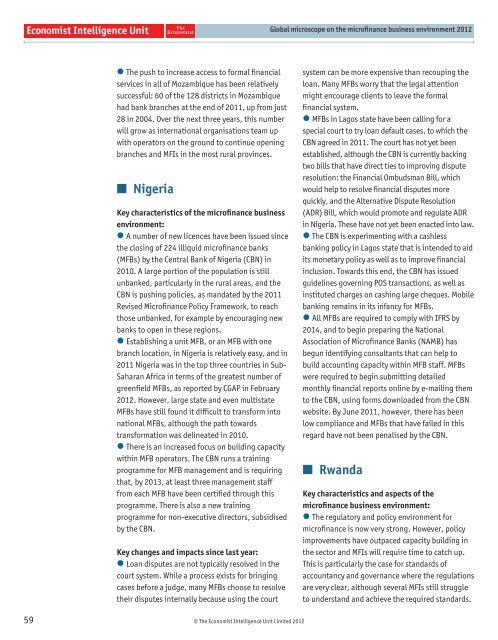
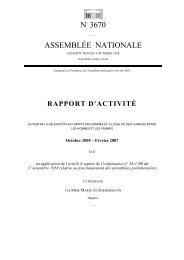
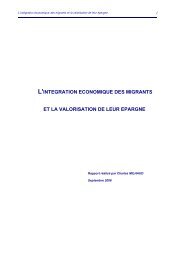
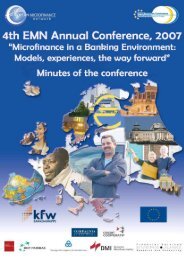
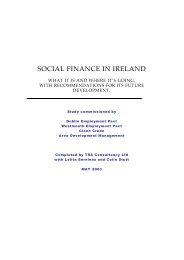
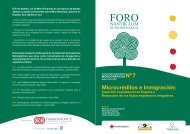
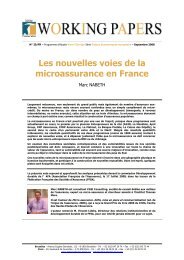
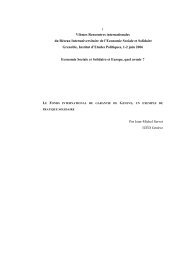
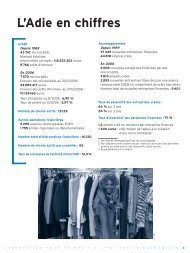
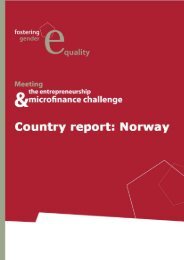
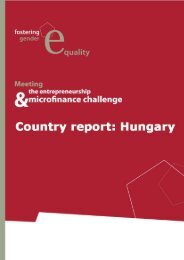
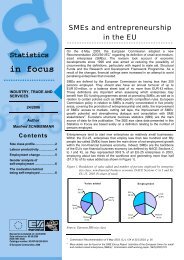
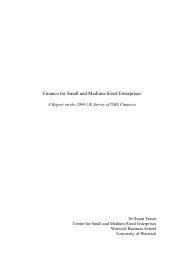
![Joint Report on Social Protection and Social Inclusion [2005]](https://img.yumpu.com/19580638/1/190x132/joint-report-on-social-protection-and-social-inclusion-2005.jpg?quality=85)
